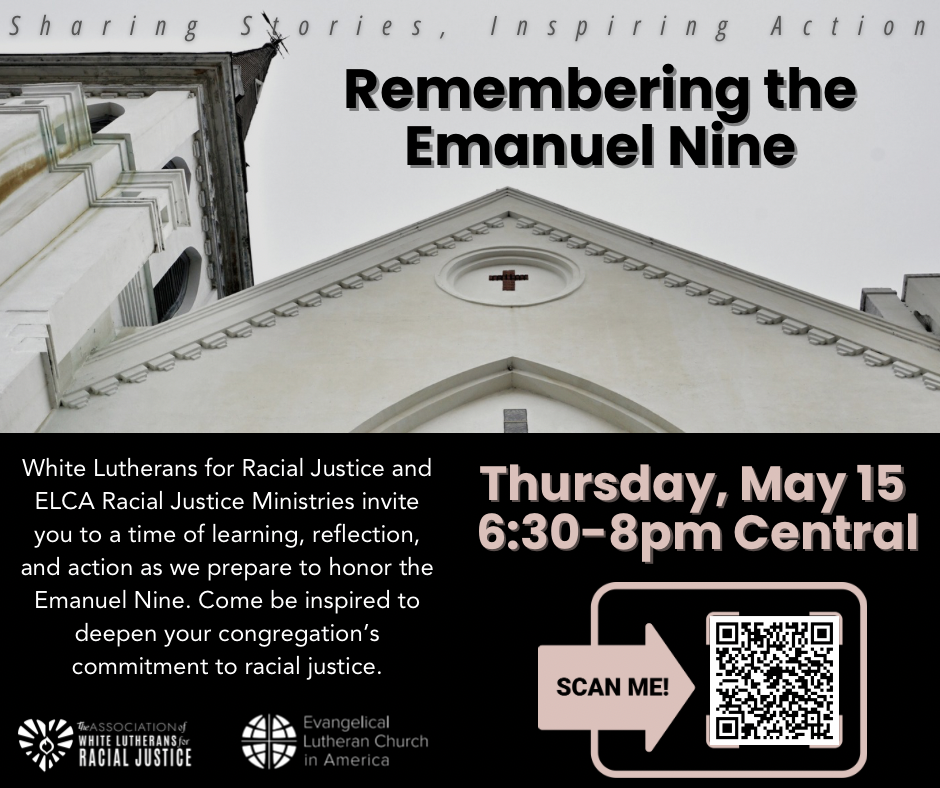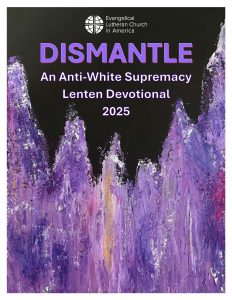To commemorate the 9th anniversary of the martyrdom of the Emanuel 9 – Clementa C. Pinckney, Cynthia Marie Graham Hurd, Susie Jackson, Ethel Lee Lance, DePayne Middleton-Doctor, Tywanza Sanders, Daniel Lee Simmons, Sharonda Coleman-Singleton, and Myra Thompson, our beloved siblings in Christ who were murdered by a self-professed white supremacist and ELCA parishioner while they were gathered for Bible study and prayer at the Emanuel African Methodist Episcopal Church (often referred to as Mother Emanuel) in Charleston, South Carolina on June 17, 2015 – Desta Goehner, Board President of the ELCA Association of White Lutherans for Racial Justice to share some thoughts about this day of repentance.
For more ELCA resources visit: Commemoration of the Emanuel Nine — June 17 – Evangelical Lutheran Church in America (elca.org)
See also: Establishing_June_17th_as_Emanuel_9_Commemoration_and_Day_of_Repentance.pdf (elca.org)
Worship Resources: Prayers_Litanies_Laments_Emanuel_Nine_Commemoration.pdf (elca.org)
As I gather with my congregation every Sunday for worship, my heart often turns to the Emanuel Nine. On June 17, 2015, nine faithful Black Christians were tragically shot and killed during Bible study at Emanuel African Methodist Episcopal Church in Charleston, S.C. This day stands as a somber reminder of the devastating consequences of racial hatred and violence.
What weighs heavily on my heart is the realization that the perpetrator, someone who grew up in a Lutheran congregation like mine, could commit such a heinous act. It compels me to confront uncomfortable questions about the environments and influences that shaped him — the people he interacted with at home, at school, at church and at work. He was one of us.
This is why White Lutherans for Racial Justice exists within the ELCA. We recognize our collective responsibility as white members of a predominantly white denomination to address the systemic racism that permeates our congregations, our synods, our institutions and our own hearts. The ELCA has issued resolutions, statements and apologies, but we have done very little to repair the ongoing harms caused by racism.
The burden of dismantling racial injustice cannot fall solely on the shoulders of people of color. As a white person, I must actively engage in the work of racial justice and equity. Yet I often shy away from relinquishing my power, my influence, my comfort. I’ve been conditioned to fear discomfort and confrontation, but I cannot allow that fear to paralyze me.
I have succumbed to this fear many times and certainly will again. I have also been the person to ask the hard questions and have felt the repercussions of that. Whiteness tells me to crawl back into my enclave, but my faith calls me out of that space. I trust that the Holy Spirit will lead and guide me as I lament and repent of my participation in white supremacy as a white, liberal, progressive Lutheran cis woman.
Whiteness exerts immense pressure, but I must not let it crush my resolve. I have witnessed how the weight of whiteness has led white leaders to falter, inflicting harm upon others without adequate accountability or restitution. We must acknowledge the risks inherent in naming injustice and asking hard questions that challenge harmful systems and processes.
We need each other in this journey toward racial justice. We need relationships that hold us accountable, that challenge us to confront our biases and privileges. Who are you building relationships with that offer different perspectives? It’s through these connections that our hearts change.
We must follow the leadership of people of color within our church, amplifying their voices and advocating for change. As we approach the 2024 United States presidential election, we cannot wait until after the fact to take action. Black and brown lives are at stake every day, not just during moments of political turmoil.
Commemorating June 17 as a day of repentance within the ELCA is a meaningful step toward acknowledging the legacy of racism within our church. But our work doesn’t end there. Racial justice is not an abstract concept; dismantling the structures of inequality that perpetuate racism requires tangible action. Join us in this ongoing journey toward racial justice. Together we can create a more just and equitable world where the lives of Black and brown people are valued and protected.
Reach out to your ministry leaders and ask them to include prayers of repentance in worship, and use resources on the ELCA Racial Justice website. Invite your congregation to use these resources in worship, in Bible study, on social media and in newsletters. And then notice whether your congregation commemorates June 17. If they do, express your support! If they don’t, gently inquire why not and advocate for change.
We believe in the power of community and the transformative potential of collective action. White Lutherans for Racial Justice welcomes people at all stages of their racial justice journey. Join us!
 Bio: Desta Goehner is president of the Association of White Lutherans for Racial Justice and the Director of Thriving Leadership Formation, with 27-plus years of serving in different expressions of the ELCA. She is a trauma-informed spiritual director and a professional Enneagram coach for people and teams in ministry, specializing in conflict resolution, facilitation, leadership and spiritual formation. Desta’s work is dedicated to fostering racial justice, personal growth and healthy, anti-racist leadership in faith communities. For more about her visit linktr.ee/destag.
Bio: Desta Goehner is president of the Association of White Lutherans for Racial Justice and the Director of Thriving Leadership Formation, with 27-plus years of serving in different expressions of the ELCA. She is a trauma-informed spiritual director and a professional Enneagram coach for people and teams in ministry, specializing in conflict resolution, facilitation, leadership and spiritual formation. Desta’s work is dedicated to fostering racial justice, personal growth and healthy, anti-racist leadership in faith communities. For more about her visit linktr.ee/destag.
For more information on The Association of White Lutherans for Racial Justice visit: website|Facebook






 Robin Lauermann holds a Ph.D. in political science and is currently completing a certificate in theological studies at United Lutheran Seminary. She teaches and researches political behavior, institutions and change in U.S. and comparative politics. Robin currently serves as a board member of the ELCA Association of White Lutherans for Racial Justice.
Robin Lauermann holds a Ph.D. in political science and is currently completing a certificate in theological studies at United Lutheran Seminary. She teaches and researches political behavior, institutions and change in U.S. and comparative politics. Robin currently serves as a board member of the ELCA Association of White Lutherans for Racial Justice.
 Bio: Desta Goehner is president of the Association of White Lutherans for Racial Justice and the Director of Thriving Leadership Formation, with 27-plus years of serving in different expressions of the ELCA. She is a trauma-informed spiritual director and a professional Enneagram coach for people and teams in ministry, specializing in conflict resolution, facilitation, leadership and spiritual formation. Desta’s work is dedicated to fostering racial justice, personal growth and healthy, anti-racist leadership in faith communities. For more about her visit
Bio: Desta Goehner is president of the Association of White Lutherans for Racial Justice and the Director of Thriving Leadership Formation, with 27-plus years of serving in different expressions of the ELCA. She is a trauma-informed spiritual director and a professional Enneagram coach for people and teams in ministry, specializing in conflict resolution, facilitation, leadership and spiritual formation. Desta’s work is dedicated to fostering racial justice, personal growth and healthy, anti-racist leadership in faith communities. For more about her visit